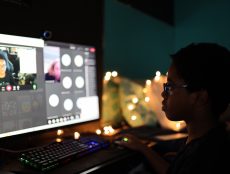
Higher Education
Industry News
Interviews
Riot Announces They Will Form Collegiate eSports Governing Council
By Henry Kronk
May 28, 2019
Last week saw numerous college eSports championships. Riot Games, the video game production company behind League of Legends (LoL) one of the most popular multiplayer battle arena games in the world, took the opportunity to make a big announcement. They will be forming the Riot Scholastic Association of America (RSAA), a governing body that will preside over collegiate eSports LoL competitions.
ESports has emerged as a varsity college sport, with over 150 North American institutions and counting offering scholarships, facilities, and dormitories for their gaming teams.
The RSAA will initially comprise of six members, including Kurt Melcher, the executive director of eSports at Robert Morris University, the first institution to debut a scholarship-funded varsity team back in 2014.
As stated in a news release, the RSAA will work on “scaling competitive operations, creating a more inclusive student community, and aligning with the goals of schools.”
But beyond that, there are still many unknowns.
There Is Still Much Work to Be Done Establishing an eSports Governance
“We had our first board meeting yesterday, and we all agree we have a lot of foundational work still to accomplish,” said Riot’s Head of College eSports Michael Sherman, last week.
A good deal of that work will revolve around rules and regulations. But unlike other college sports, which often differ significantly from professional equivalents when it comes to the rules, the RSAA will preserve existing professional eSports gameplay.
“Riot has the luxury of having a global community of practice for league operations and management,” Sherman said. “We have an internal federation that sets the global professional rules and we have a team that develops the rules in the North America pro league, the LCS. With these best practices and expertise, we are able to develop a standardized ruleset that we run across all varsity level League of Legends competition in the US and Canada.”
LoL game violations, furthermore, generally don’t require refs (or admins) to head to the replay booth.
“Most common [violations] are players being late to matches, which results in a minor penalty, scaling up to a full game forfeit depending on how late they are,” Sherman said. “Less commonly, we issue suspensions due to unsportsmanlike conduct. We enforce sportsmanship across both official college matches, but also online non-regulation matches. We hold players on college teams to a higher standard than the average player as they act as a role model to the rest of the community.”
Riot Steps in While the NCAA Steps Back
Conduct off the console has been a sticking point for an existing collegiate sports governing body that has been considering eSports for some time. During their last meeting in April, the NCAA voted to table the idea of adding eSports to their scope of practice. NCAA President Mark Emmert previously cited “violent” and “hugely misogynistic” content of eSports gaming as primary concerns, according to the Associated Press.
The RSAA and NCAA make for an imperfect comparison. The former has no plans when it comes to regulating where students take eSports gaming. “Hundreds of LoL players are currently on esports scholarships,” Sherman said. “While we’re not blocking players from earning money, our focus will be to continue to grow the number of scholarship opportunities available to players.”
On the other side of that coin, Riot Games is a for-profit company, and it isn’t difficult for one to imagine conflicts of interest arising down the line. Still, Sherman maintains that, for now, the work of the RSAA will focus primarily on supporting and encouraging collegiate LoL competition and its players. “Our core business is the long term success of League of Legends, which relies on the ongoing engagement with players,” he said. “We believe our interests are largely aligned with the board of advisors, and schools. It will be important for us to empower the board to have meaningful impact on our work, and our first meeting has put us on a great path for doing so.”
Featured Image: Sean Do, Unsplash.









No Comments